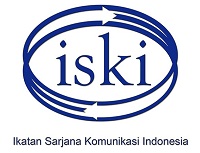Political Communications, State, and Institutionalization of Democracy
Abstract
Keywords
Full Text:
PDFReferences
Anderson, Benedict R. O'G. (1999). "Old State, New Society: Indonesia's New Order in Comparative Historical Perspective", in Benedict R. O'G. Anderson, Language and Power: Exploring Political Cultures in Indonesia (Ithaca and London, 1990), p. 95.
Ali, Novel. Peradaban Komunikasi Politik, Remaja Rosda Karya, Bandung.
Asshidiqie, Jimly. (2017). In his essay: The Irony of Political Parties, Kompas News Paper 23rd September 2017.
Bambang. AS. (2015). Demokrasi, Komunikasi Politik Indonesia Dan Globalisasi (Identifikasi Dan Harapan Perencanaan Ulang), Jurnal Studi Komunikasi & Media, Vol. 19 No. 2, July - December 2015, Hal: 303 – 316. Jakarta.
Dahl, Robert. (1971). Polyarchy: Participation and Opposition, New Haven, Yale University.
Lippman, W. (1992). Public Opinion, NewYork, Macmillan.
McNair, Brian. (2003). An Introduction to Political Communication, 4th ed, Routledge, p: 19
Muller, Jerry Z. (2003). The Mind and the Market: Capitalism in Western Thought, New York: Anchor Books, p.51-83
McVey, Ruth. (1996). Building Behemoth: Indonesian Construction of the Nation-State, In Daniel Lev and Ruth McVey, (eds.), Making Indonesia: Essays on Modern Indonesia in Honor of George McT Kahin, Ithaca, New York: Cornell University Southeast Asia Program, p. 11.
Robison, Richard. (1986). Indonesia: The Rise of Capital, Sydney: Allen & Unwin.
Rueschemeyer, Dietrich and Peter B. Evans. (1994). The State and Economic Transformation: Toward an Analysis of the Conditions Underlying Effective Intervension, dalam Peter B. Evans, Dietrich Rueschemeyer & Theda Scocpol, (eds.), Bringing the State Back In (Cambridge: Cambridge University Press, p. 46-47.
Wade, Robert. (1995). Governing Market: Economic Theory and the Role of Government in East Asian Industrialization, Princeton, New Jersey: Princeton University Press.
Weiss, Linda & John M. Hobson. (1995). States and Economic Development: A Comparative Historical Analisis, Cambridge: Polity Press.
Yenrizal. (2003). Budaya Politik Kulit dan Komunikasi Politik demokratis di Indonesia, Jurnal Komunikasi MediaTor Vol 4 no 1 tahun 2003, p; 151-156.
DOI: https://doi.org/10.29313/mediator.v10i2.2735
Refbacks
- There are currently no refbacks.

This work is licensed under a Creative Commons Attribution 4.0 International License























